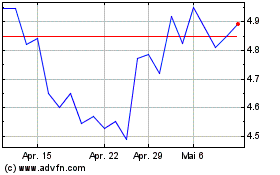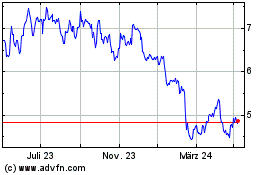Thyssenkrupp Board Seeks to Oust CEO in Renewed Upheaval -- Update
25 September 2019 - 3:25PM
Dow Jones News
By Ruth Bender and Ben Dummett
BERLIN -- Thyssenkrupp AG's directors moved to oust the
company's chief executive 14 months after he took the job, in the
latest effort to shake the company out of years of slowing sales,
shrinking profits and hesitations over strategy.
Thyssenkrupp -- a former crown jewel of German industry, with
products ranging from high-grade steel to submarines and elevators
-- said late Tuesday that its supervisory board's personnel
committee recommended that Guido Kerkhoff be replaced by Chairwoman
Martina Merz until a long-term successor could be named.
The directors decided to move against Mr. Kerkhoff after he
failed to convince them that he could reverse a yearslong erosion
of profits, people familiar with their thinking said.
Drama-plagued Thyssenkrupp has become a prime example of the
perils and pitfalls of attempting to turn an unwieldy conglomerate
into a simpler, nimbler company and to squeeze higher value from
disparate businesses.
Siemens AG, another German behemoth that has dabbled in
everything from lightbulbs to mobile phones and gas turbines, has
been aggressively pruning underperforming businesses, simplifying
its corporate structure and trimming its head office.
Thyssenkrupp, by contrast, long resisted pressure to do so and
only relented after becoming targeted by activist investors. Mr.
Kerkhoff, the former finance chief, became CEO in July 2018, ending
a monthslong hiatus after his predecessor left under pressure from
investors.
Mr. Kerkhoff's first, bold initiative -- a plan to split the
company into two businesses -- was abandoned after the European
competition watchdog blocked a planned European steel joint venture
with India's Tata Steel Ltd.
Recently, a deteriorating economic environment has added to
Thyssenkrupp's homegrown problems. The company, which issued four
profit warnings under Mr. Kerkhoff's short tenure, has been hit by
slowing demand from car makers, higher raw material prices and
rising uncertainty caused by international trade conflicts.
Some directors thought Mr. Kerkhoff was moving too slowly,
according to people close to the board. Mr. Kerkhoff announced
plans to shed nearly 4% of the staff and nearly halve
administrative costs in May last year, when the company issued its
third profit warning.
Some board members also disagreed with Mr. Kerkhoff's decision
to only sell a minority stake in the elevator business after the
company had considered a full or partial divestment or an initial
public offering, these people said.
Trade union IG Metall said the sudden departure of Mr. Kerkhoff
had created more unease among employees already troubled by the
uncertainty over planned asset sales.
Thyssenkrupp said the planned overhaul would be "systematically
continued."
The Krupp foundation, representing heirs to the company's
founders with a roughly 21% stake, and Cevian Capital, which holds
about 18%, said they fully supported Ms. Merz. A trained mechanical
engineer, Ms. Merz spent 17 years at auto supplier Robert Bosch
GmbH and has overseen restructuring as a board member of Swedish
car maker Volvo AB.
"We expect that the new leadership will speed up the
transformation process that Thyssenkrupp so urgently needs, and
improve the quality of implementation," said Lars Förberg, founding
partner of Cevian Capital.
Shares in Thyssenkrupp fell about 1.5% Wednesday and were down
about 18% so far this year. This resulted in the company's ousting
from Germany's blue-chip DAX index earlier this month.
Write to Ruth Bender at Ruth.Bender@wsj.com and Ben Dummett at
ben.dummett@wsj.com
(END) Dow Jones Newswires
September 25, 2019 09:10 ET (13:10 GMT)
Copyright (c) 2019 Dow Jones & Company, Inc.
Thyssenkrupp (TG:TKA)
Historical Stock Chart
Von Mär 2024 bis Apr 2024

Thyssenkrupp (TG:TKA)
Historical Stock Chart
Von Apr 2023 bis Apr 2024
